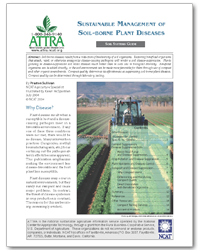Sustainable Management of Soil-Borne Plant Diseases
By Preston Sulllivan, NCAT Agriculture Specialist
Overview
Soil-borne diseases result from a reduction of biodiversity of soil organisms. Restoring beneficial organisms that attack, repel, or otherwise antagonize disease-causing pathogens will render a soil disease-suppressive. Plants growing in disease-suppressive soil resist diseases much better than in soils low in biological diversity. Beneficial organisms can be added directly, or the soil environment made more favorable for them through use of compost and other organic amendments. Compost quality determines its effectiveness at suppressing soil-borne plant diseases. Compost quality can be determined through laboratory testing.
This publication is not available in digital format. Please download a copy using the download button at right.

